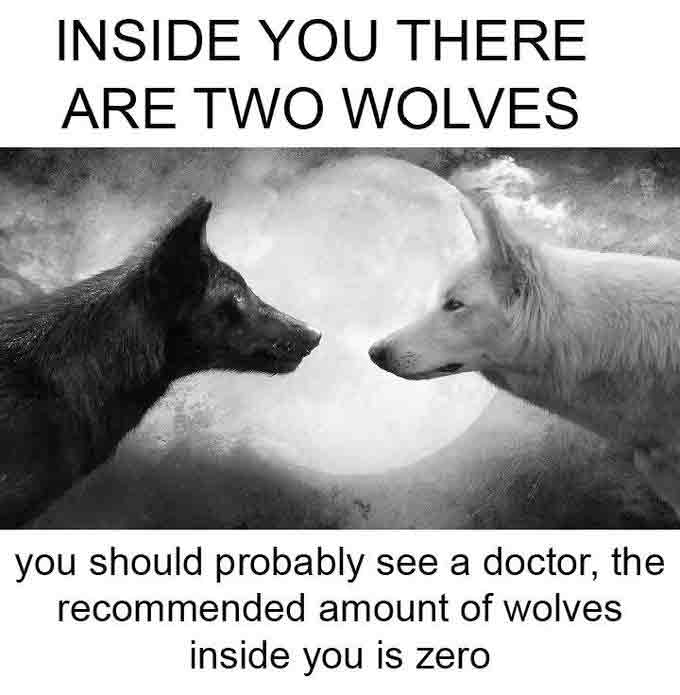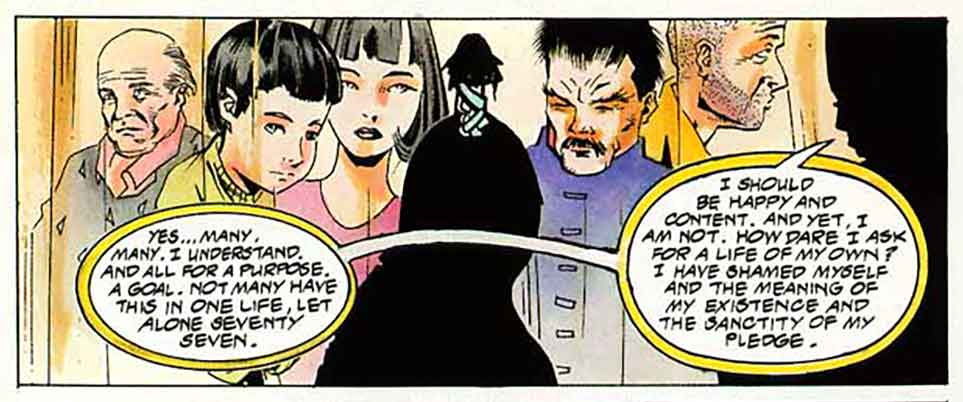
Aren’t You Glad You Weren’t Aborted?
Content Warning: abortion, depression, antinatalism, sexual assault, suicide, death, bullying, social exclusion, and gaslighting. Please don’t read this if you’re not in a strong place mentally. Bookmark it for later.
Oh, and I curse a little.
Note: The embedded YouTube videos in this article are music you can listen to passively as you read.
Join me for a moment.
It’ll be bumpy, but I hope you’ll understand me better by the end.
A door opens in front of you.
You remember nothing before this moment; no name, no education, no culture, nothing. No time to think, the door swings open and reveals a huge party full of strangers.
A lovely woman immediately welcomes you in, taking a hand and guiding you around the enormous building. She introduces you to a few people, tells you which ones are “nice”, and warns you to stay away from “the mean ones”. She and the other attendees say it’s really important to trust her implicitly. Listen to everything she says. Obey her every demand. Be grateful she brought you here. Pledge eternal loyalty to her. To do otherwise would result in everyone at the party hating and being mean to you.
Good and Bad People
As the tour continues, others who arrived around the same time you did are being shown around too. Some of their guides aren’t being as kind to them. They’re yelling, hitting, shaming, yet demanding the same level of devotion and respect as your guide.
You try to take it all in, but it’s difficult. Everyone points and labels things, sometimes several at a time. You’re directed to memorize sequences of numbers, learn an entire new language, and designations of good and bad.
You see several “nice people” beating a defenseless man on the ground. Pearls of blood strike and cling to “the nice ones”‘ clothes when the man cries for help. Nearby, “mean people” are trying to stop the violence, but they’re shoved away by other “nice people”. These particular “nice people” are the ones you were taught to ask for help if you were ever scared.
Many of the “bad people” have darker skin than the ones labeled “good”. It’s not all of them though, and the lighter-skinned folks pointing everything out make sure to tell you repeatedly it’s not because of their skin color.
Rites of Passage
You’re escorted to a ritual to show everyone you’re one of the good people. A guest sitting a few feet away is pulled away to a corner of the room and raped. After a few minutes, the man who did it walks up to the pulpit and teaches everyone else in the room how to be good. No one else seems to notice when you or the victim cry out. They continue to dutifully listen to him.
You and a few other guests stand up to leave the ritual and exit the room as quickly as possible. No one tries too hard to stop you, but others are blocked and brought back.
Catching breath in the next room, you look up to see lovers holding hands. Your heart warms and beats a little slower. You didn’t realize how stuffy and stifling the other room felt until now. This is sweet. It’s easier to understand than anything else so far.
Suddenly a small group from the previous room starts screaming through the doorway.
They’ve come for you.
They burst into the room, separate the lovers, and take them away somewhere unseen. When you ask one of them what’s happening, they say the hand-holders were “bad people” and “good people” took them away to protect you, though you never felt threatened or asked for such protection. Everyone remaining in the room who were comfortably relaxing and talking are now stone-faced, silent, eyes downward.
Your Name
Your attention is directed back to the woman who first invited you to the party. She calls a name that you’re told belongs to you. You leave the petrified room and follow her to a small private area. It’s more comfortable here. Warmer. Calmer.
She brought you to that ritual. She was on the opposite side of the room from where it happened, so she must have no idea. If she did, she’d probably have cried out and left too. Was the victim’s guide there too?
Before long, you’re being prepared to go out again.
She dresses you in clothing she picked out based on parts of your anatomy. When asked why those parts are important, she only says someone will explain later. She instructs you to keep them covered with clothing designed to represent them.
She drops you off in a room filled with a few dozen other new guests. They look just as confused. Only half are dressed like you, and the two groups are treated differently — taught different skills, shown different entertainment, given different options for what they can do for the rest of the party. One group has more responsibilities and less support than the other, but the reason is unclear.
Some of the others’ clothing and gifts aren’t as fine as others. Some have dirty clothing with holes worn into them. Others have sparkly jewelry and pretty detailing. You fall somewhere between these differences, and make friends with a few others in similar garments. Several guests complain about their clothing being uncomfortable and not fitting well.
Questions
None of it makes much sense. Even the “nice” attendees haven’t explained the important stuff; they keep saying you’ll understand later. Instead, they want you to listen to their stories and memorize more numbers.
Minutes and hours go by. Will anyone ever explain why you’re here?
Discomfort eventually grows to the point where you start looking for the door. When asking others about it, many say “You should never look for that! The other side of the door is a horrible scary place. Merely looking for it is something only bad people do!”
Someone asks “Why are you trying to leave? Aren’t you enjoying the party? Everyone else is!” Over her shoulder are several others who are also visibly uncomfortable. Some of them are being teased and shoved around for it.
A few minutes later, some of them are shoving others who were previously huddled alongside them.
The Exit
You decide to stop asking about the exit, but the curiosity lingers. Anything beyond it is incomprehensible, and the only folks who seem absolutely certain about what’s outside say it’s terrible. But those are also the ones shoving other anxious attendees around, so maybe being someplace they avoid would be a blessing.
As the party continues you’re ushered into room after room and told what’s expected. More choices arise, which is refreshing until others get mad about which ones you pick. You start considering what others will think before making your decisions, but it’s difficult to predict. The options feel more like traps and tests than freedom.
Every now and then someone asks you to recite the phrases and numbers you were told to memorize earlier. You’re rewarded for right answers and everyone declares their disappointment otherwise.
Taking a moment to look up from the current task and gazing around the party, it’s a chaotic mess but most seem to be enjoying it. While observing this, your cheeks ache from the forced smile you’ve been wearing for longer than you realized. Who else’s faces hurt among those happy-appearing partiers?
Evening
There’s no sign the party will end as the sun sets through a large picture window. A man who silently appeared next to you startles you and hands you a broom. “You have to help clean up or they won’t let you eat the food, drink the water, or sleep on a bed.” You nod, take the broom, and start sweeping.
Later at the buffet table, you chat with other sweepers. It’s a pleasant moment of comfort, commiseration, and shared understanding.
Leaving the kitchen and heading toward a bedroom, you pass a door that’s open only a few inches. Bright light and loud music, louder and brighter than the rest of the party, escapes the crack. Curiosity inspires investigation and you see six people at a buffet much fancier than the one the sweepers had. Each person inside is wearing the fanciest clothing you’ve ever seen. You recognize some as the guests shoving the others around earlier. None swept floors at any point that day.
When you try to open the door and walk in, a man standing just inside blocks the way and says you’re not allowed there. He doesn’t explain why. You get the impression he wouldn’t be welcome at that table either. Why would he agree to this? He’s obviously stronger than all six of the others inside. Why not let everyone in and lead the way? He’d be a hero.
Dusk
You trip over something in the hallway. It’s a person laying on the ground! She’s thin and her breathing is shallow. Looking for a way to help her, you ask where her bedroom is. She tells you to leave her alone, and obviously doesn’t trust you. You recognize her as one of the anxious attendees getting shoved around earlier.
When you ask others what to do, some tell you to ignore her and try not to think about it. Some suggest you give some of your food to her, so you do that. You eat half as much and give her the other half whenever you see her. She seems to do a little better over time, but she still sleeps on the ground in the hallway. Your bedroom is too small for two, and she probably wouldn’t accept the offer anyway. Sometimes she gets hurt and no one helps her, but you don’t have any medical skills or supplies. Hopefully someone else shows up to help.
As the night drags on some attendees grow healthier, receive luxurious gifts, and upgrade their rooms. They work less while you work harder, eating half the food, drinking half the water, and sleeping in the same room. Anyone you mention it to tells you how fortunate you are, and you should be grateful for it. Some warn you those things can be taken away any time if you stopped sweeping or kept asking questions.
Dawn
Someone stands waiting for you at your bedroom entryway when you wake the next morning. “Head to the door to welcome a new guest to the party” they strongly suggest. Despite others telling you this day would come, you don’t know if you want to go through with it. The party isn’t really that great for everyone who can’t go into the brighter rooms — and especially for the dark-skinned, the anxious people, the lovers, and anyone else someone points at and calls bad.
Are you even able to show a new guest around? Do you know who to point to and say good or bad? Will you hand them your broom so they can eat, drink, and sleep too? What will you do then? Will you have to stop helping the woman in the hallway?
The one encouraging you doesn’t offer any answers, but continues to insist.
Walking down the hallway, more attendees are escorted alongside you. Some are excited and smiling, but others are handled more forcefully. Their arms squeezed and bodies dragged along; some struggling violently against it. Every few moments the door opens and someone is shoved in front of a blank-faced new guest. A lump forms in your throat as you stand in line behind them.
Stepping Out From the Metaphor
In case it’s not obvious, this Kafkaesque fictional situation is an attempt to illustrate my feelings about birth, life, agency, social pressure, death, and the culture we’ve built as Americans and greater humanity.
Before I continue, I feel the need to reassure.
I’m OK.
I’m healthier than I’ve ever been, both physically and mentally. I have continuously made the best of this party I never RSVPed to, and I intend to continue doing so. I still have no idea what’s on the other side of the door, but I’m no longer so uncomfortable at the party that I want to sprint there anyway.
I want readers to see me and carry what I’m saying here with them into the next portion, which is going to be rough.
- I am okay.
- I’m not going anywhere.
- None of this is new. It’s just always been hard to talk about openly.
This post and others about these topics I share regularly on what is probably a massively depressing social media feed are a philosophical examination of the world humans built before I got here and continue to build upon. They’re topics I’m more passionate about than nearly anything else. They’re taboo to talk about, but every time I do — thinking I’m the only one — dozens if not hundreds confide in me privately how they feel similarly.
Tyranny of the Majority
We’re driven to hide from the dominant culture of “life is a precious gift” and all the uncritical positivity heavy-handedly pressing the lie into us.
We bend beneath the pressure, especially while we’re young, because our clay is still soft.

That pressure doesn’t come from righteousness. No one has proven with any universal or scientific certainty that these societal conventions are healthy or sustainable. Many studies imply the opposite. They’re certainly not for everyone.
That’s the thing about pressure. If something is actually true, we don’t need it.
I would rather have not been born.
My parents didn’t know I would feel this way, so I don’t blame them. They did an excellent job raising me. Better than most other parents I’ve encountered in my life, and we continue to maintain great relationships as adults.
Notice the very first thing I do after stating my feelings about my own existence is to protect the feelings of others. This is how hard this has been to talk or write about.
I’m white. I was born male and can still pass masculine whenever I want to. I was born in America to two parents who wanted me. I felt safe at home with my family when I was young. I feel safe in my home today. There were times in between when I didn’t, but I am still luckier than most. I have more privilege than most on the planet, and yet…
I experience the world as a cruel place. Most children are born to a confusing world that forces us into a normative model that doesn’t suit a large portion of us. So no, I’m not glad I wasn’t aborted. It’s not the clever “gotcha” question the people who ask it seem to think it is.
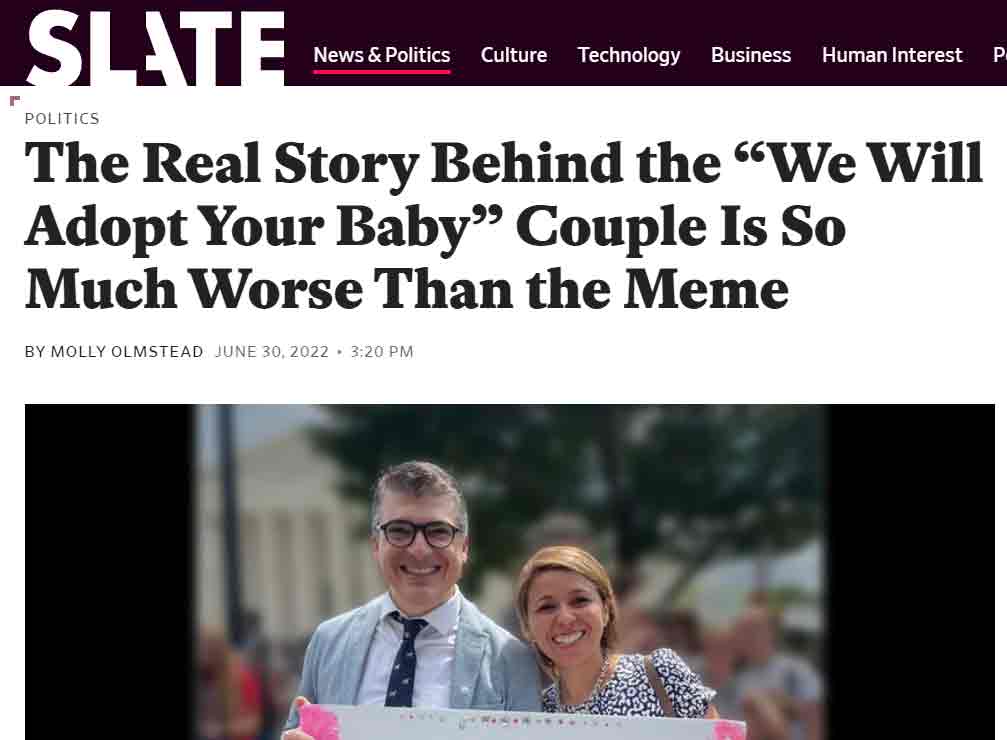
Too many arrive alone or are taken from their parents to be sold like a commodity.
Conception
For some, the idea of us doesn’t change much once we’re born. It won’t change when a child doesn’t want to play baseball or join ballet. It doesn’t change when they don’t want to be dressed and spoken to the way authority figures want them to be.
From the moment we exist as an idea in the minds of our parents and society – not even as a material thing like a sperm or egg cell; a wholly different kind of conception – we serve a utility to each person aware of us. Expectations arrive before we take our first breath.
We will be citizens. We will work. We will pay taxes. We’ll produce another generation of children. We will better the world for our presence. We will be happy.
Each parent wants us (or doesn’t) for different reasons.
We will obey our parents. We will stand up straight. We’ll speak our parents’ language(s). We look them in the eye. We pee in the toilet. We speak only when spoken to. We go to school. We get good grades. We don’t cause trouble. We get a job.
Someone designed an entire identity for us before we had any say in the matter. Maybe they argued with others about it without us there.
We will be Christian. We will be a man or woman. We will want sex and romance. We will fall in love and marry a cis person of the opposite sex. We will want children of our own.
Some adults let them go more easily than others. When we begin to speak, they might honor our wishes not to hug or kiss a relative. They may stop calling us a nickname we don’t like. Not always, though.
We will follow in our family’s footsteps. We will dedicate our lives to loyalty to the family cause. We will vote the way our family does. We will raise our kids the same way we were raised.
Often parents’ expectations don’t change when we reject the myths they taught us. We live as disappointments or get disowned.
We will hit our kids the same number of times. We will disown the gay ones and pretend they don’t count. We will tell everyone one of our kids is crazy and not to believe anything she says.
Their minds may never change, even when we call out injustice in their traditions. Even when we point out how they hurt us.
We will never complain or question our parents, bosses, gods, and other authority figures. We will love them unconditionally.
And when we try to break these cycles, they may resent us for it.
Career
In adulthood, everything we do pivots around our job. We must live near where we work. Our friends are often colleagues. Others live in the same area we do, so they may have similar jobs and similar incomes. Our ideological and corporate allegiances grow from our perspectives inside these bubbles.
Survival is based on the whims of the powerful. Employers can, and often do, steal our wages. They can fire us for no reason in many states, and functionally a large company would swat away a wrongful termination lawsuit like a gnat in others. They could badmouth us to other employers. They could financially decimate us within months. Every consequence rolls downhill. I must trust they won’t and live my life like I’m not constantly on a tight rope.
When we do what we want, it’s vacation. A brief moment separate from the other 95-99% of our time spent on survival, maintenance, and social obligations. This is the tiny sliver of the pie chart of our lives we get to ourselves, and even that’s constrained. We must ask our boss for permission to have this time. We’re still due back at work Monday morning, so we can’t wander off to another country and casually explore it. We can’t show up without a full night’s sleep, so we can’t stay out late with friends.
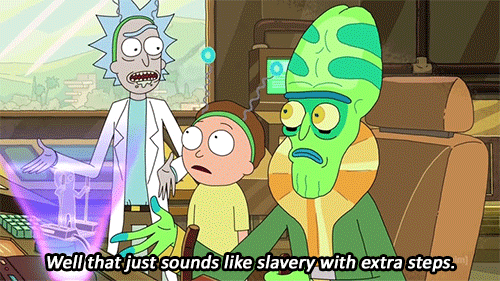
And if we opt out?
If we decide not to do any of it, we sleep on concrete as cops come by and arbitrarily force us to move to another slab every few hours. A fate the Geneva Convention forbids for war criminals in prison.
We can’t leave city centers because we’d starve. There aren’t enough generous souls to help us survive with a portion of their own lives — their finite time on this planet crystalized into coins, dollars, fast food, or cheap goods purchased from multi-billion dollar conglomerates — if we move someplace less populated. We’ll be jailed in some for asking. We participate in capitalism or live in its destructive wake, while those aboard survive to write the history of our lives, blaming us for our fates.
Then What?
We fantasize about retirement, a mirage in the distance past miles of desert where we’ll finally have enough money saved to do what we want with our time.
How old will we be when that happens? 60? 70? Will we live to see the day?
When we get there, will we live in constant fear that we didn’t save enough? Will an unlucky catastrophe outside our control strike at the wrong time and destroy the tiny safe space we spent our entire lives securing? Will we trust the wrong people and have our home torn away from us by a reverse mortgage because we didn’t bet accurately on when we were going to die?
I know so many grown-ups who internalized all the expectations, including the contradictory ones.
Kids who struggled desperately to make their parents proud, then woke up one morning, middle-aged, mid-career they hate, with their parents gone, not knowing who they are.
Shamed for coming out at 60 and “breaking up their families” because it was dangerous or impossible to love who they truly love before then. It may still not be safe, but they can’t bear dying without ever living their truth.
People incapable of seeing their beauty because society expects the impossible. They suffer from eating disorders, body dysmorphia, and the cascade of health issues spurred by them. They’re body shamed, harassed, ignored, and generally devalued if they aren’t genetically gifted with conventionally attractive features.
Little girls and boys are raised in religious traditions prizing a “purity” they can never achieve, no matter how they tried. Decades of their lives dedicated to it, and today they’re married to someone they don’t love with children they regret having. Permanent responsibilities they could lose everything for shirking or handling poorly. All things they were pressured into wanting since birth.
The “Party”
Credit card companies, charlatan religious leaders, and gig economy apps are pimping poor people’s time and resources for profit. Social platforms and other media companies pump out addictive products packed with personalized psychologically manipulative advertising without hesitation. Marketers strategize every day about ways to make us feel incomplete without whatever coping mechanism they’re selling. Many are working together, openly or not. Pyramid schemes want us selling knives, beauty products, crypto, or whatever other junk to pay for all the essentials we can’t afford because wages have been stagnant since before we were born.

A local radio station holds contests where the reward is the ability to pay our bills. Not a vacation. Not a new car. Momentary debt relief is a luxury for a lucky few of us to get excited about.
Military recruiters line up at high schools to trick children into trading their lives and health for a pittance and some empty salutes from politicians wearing flag pins who won’t be bothered to help them get healthcare or keep them housed when and if they come home. They’d rather spend their time cutting public education to make the next batch less prepared for the world of predators they’ll be thrust into. Moving on to strip away benefits for the poor, children, and seniors, or prevent those who’d likely vote for their opponents from voting.
We elect politicians who care more about making sure insurance companies will be okay while they post record profits every year, simultaneously denying coverage to patients for life-saving treatments. All because taking care of the most basic needs of our citizens the way dozens of other countries with fewer resources than us is “unrealistic”.
And Why?
Where’s the part where the world embodies the sentiment “life is a precious gift”?
We tread lightly through the minefield of life so the existing power structures may continue. We accept helplessness because our cage has prettier bars than our neighbor’s.
I’m guilty too. I’m part of this misery machine by taking a broom someone else could have, eating food others could eat, and sleeping on a bed another could occupy. I want as many creature comforts as I can get while I weather this awful hullabaloo too, but I try to limit how many worse-off people I need to step on to get them. I try not to look away when I do to protect my comfort. I try to listen and change when I can without going insane.
If this faux-monarchy we live in where a ruling class gets to do whatever they want at the expense of billions who never had a choice to do the same is what humans decided to build and continue propping up, I will not doom a single new person to this existence.
If society wanted me to walk into this party, think it’s awesome and want to invite as many new attendees as I could to come join, then they should’ve planned a better party. And I refuse to lie to the new guests arriving and tell them they’re the ones who need to change to fit into it.
Don’t fucking gaslight me.
I’ve seen everything I’ve written about here consistently throughout my life — in moments of happiness and sadness. I was diagnosed with chronic depression in my late twenties, but this perspective has existed much longer. I recognize it’s different from most — a big part of why I write about it — but it’s not like I’m making it all up.
The claim that we can choose how we see the world is absurd. The only way to block peripheral vision is to turn a blind eye to the suffering of others; the only choice offered is to bury my head in the sand.
I hear the mis-used version of the “two wolves” story from buffoons with sand-crusted eyes whenever my shit gets a little too dark for them and they need a way to get out of the conversation. I’ve lost patience with tip-toeing around their ignorance.
I’m not the only one either. We can’t be punished into seeing the world in a more optimistic way. The world can continue to pretend we’re alone and crazy. The powerful can leverage their ill-gotten power over society to force us to strain our cheeks with false smiles whenever they’re looking. We will never dive into the murky ocean of lies they swim so deeply in that they can’t see the surface anymore.
Receipts
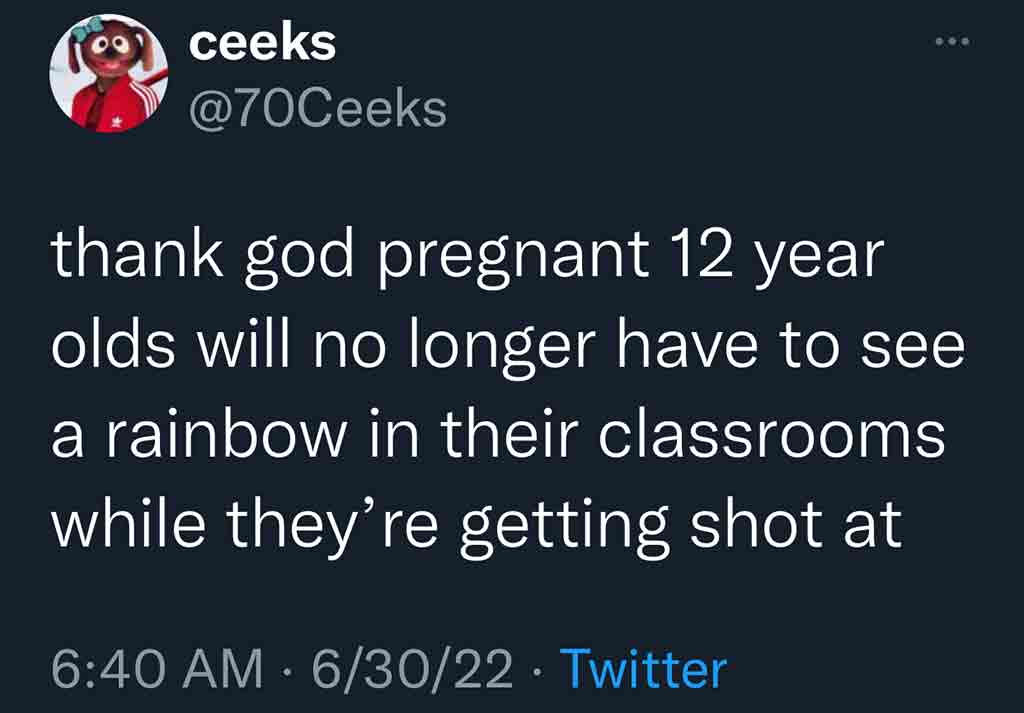
Confirmation bias is a real thing and I take it into account in every moment I spend processing, but I have receipts. I have evidence of the horrible ways I and others were treated. We [who are willing to look] see new events every day of us continuing to treat humans like livestock we can bend toward our own benefit somehow.
I doubt anyone actually clicks on all the linked text I thoroughly place in my opinion pieces on this site, but I second guess every thought I have. No one doubts me more than me; it’d be a tie at best.
If “most people”* decide things are great the way they are today, I want out.
* Let’s not kid ourselves into thinking democracy works here while 5 of the 6 Supreme Court Justices who just informed us we don’t have a right to do what we want with our own bodies were appointed by presidents who lost the popular vote.
Tinted Glasses
It’s no healthier to use discomfort as a barometer for truth than it is to cling to comfort. There’ve been times in my life when I’d be critical of any good news I saw and delve into it more skeptically than I would for bad news. If I’m only skeptical for some information and not all information, I’m seeking confirmation of my existing views instead of pursuing the closest things to truth I have access to. I’ve spent much of the last decade balancing it out.
Since 2016, and more since 2020, I begged to be wrong. I hoped every moment the world would prove me wrong, but my predictions from this more balanced approach have confirmed my perspective to a devastatingly disappointing degree of accuracy.
This is why I was able to purchase my home at the right moment and why my investment portfolio is doing fine despite a global pandemic. My blood money from all my cynical bets is the most disgustingly awful-feeling proof of success I can imagine.
My glasses are less tinted than ever. I have a clearer picture of humanity at scale, and it hasn’t gotten prettier.
A Long Time Coming
This piece was what I wanted to write when I discussed why I don’t want children of my own. I don’t want to bring new souls into this world to be peers of weaponized children and the horrifying adults many of them turn into.
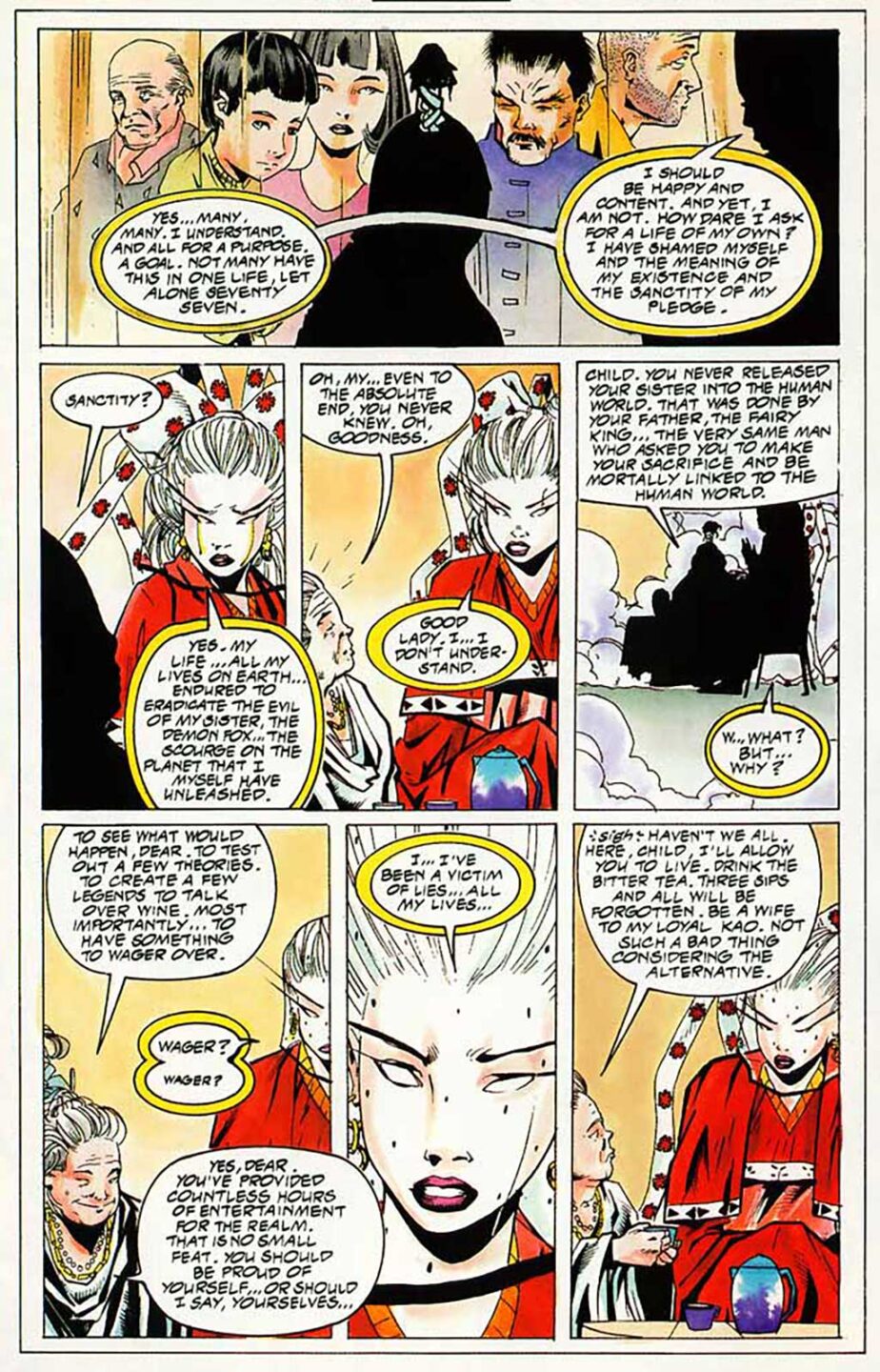

The titular question of this article is one I’ve been asked regularly for approaching twenty years. I can’t think of a single time it’s been earnest. No one wants or expects my answer, and I usually don’t burden them with it. I didn’t tell kids at school when I knew Santa wasn’t real. Likewise, I generally reserve shattering just world fallacies for when I think the holder’s maintenance of that belief is hurting others, but it’s been hurting others quite a bit lately.
This week seems like an appropriate time to finally say it all out loud to everyone.
But have you considered…?
I’ve had more conversations than I can count about these topics over the years, and some responses never seem to die.
“Life is hard for everyone!”
I appreciate the attempt to water down my personal experience and perspective, but that’s also exactly my point. Life is a struggle where we’re each pitted against everyone else in a zero sum battle for resources that’s largely already decided by the zip code where we start.
It never fails. Every time I speak openly about my experiences and feelings, someone shows up to inform me that everyone feels that way.
- I wouldn’t be talking about it if everyone else was. I attempt to specifically share points of view I don’t find in common discussion.
- Don’t project your perspective out to everyone. You can come to me and say “I feel the same way!” but you can’t speak for the general human condition.
- This phrase exists to quiet or silence my voice. Go spend days writing your own article instead. I wish you the best and hope more people read it than mine.
“It’s better than it used to be!”
In other words, the world was even worse before. Okay. What am I supposed to do with that? Cryogenically freeze myself so I can start over in 100 years? Maybe by then society will be more accepting of autistic queer kids, but they’ll also be dealing with a global climate refugee crisis, massive death tolls from hunger. And they’ll probably still be shitty to black and brown people. All that and I might not even have coffee or chocolate to help me cope.
Or am I supposed to go against every instinct I have and trust that the future is magically going to get better? After spending so much time making sure I’m sufficiently critical of information I receive, I’m to ignore it? Should I bet someone’s life and the rest of mine on that hypothesis? I’ll be thrilled if I’m wrong — literally nothing would make me die happier. Everyone else’s kids can enjoy it.
“Your kid could help solve the world’s problems!”
I’ve been told multiple times that my child could be the hero who saves the world. They could be the latest coming of Christ!
Someone who I’d purportedly love more than anything I’ve ever loved could work their body ragged, do the right thing with every ounce of their being, and I can watch them get crucified by barbarians for it. All so the world could continue the way it was and bigots a thousand years later can tell everyone the reason they’re bullying and abusing their helpless “others” is because of my kid.
I love the Jesus I was taught about as a child. Nothing would make me prouder than to have a child like that. This scenario would be a best case scenario, and I still don’t want it.
It could also backfire colossally! Imagine if a prophecy said my kid would bring balance to The Force without realizing the imbalance they were trying to cure was much better than the balance they were going to bring.

In either case, I’d be placing expectations on someone who never accepted my mission. I’d be perpetuating a cycle of abuse.
No thanks.
This world isn’t good enough. Not for me. Not for my fictional never-born children. It’s not good enough for any of us. Humanity was a mistake and Mother Nature will shake us off like a bad case of fleas.
Rage & Kindness, Hand in Hand
It may be difficult to find in an article like this one, but my rage comes from intense empathy. Most of the suffering in the modern world is preventable. The people and systems we built and continue to prop up are pointlessly cruel. It would infuriate any kind person paying attention.
People who feel like I do are far more common that most seem willing to talk about. They’re some of the most caring souls I know towards animals, children, the disabled, the impoverished, minorities, and anyone else without power in this world.
We understand agency, power, and trust in ways that those who see only the shining city on a hill can’t and won’t. We are a dying breed of the most caring and merciful; the meek who were supposed to inherit the Earth.
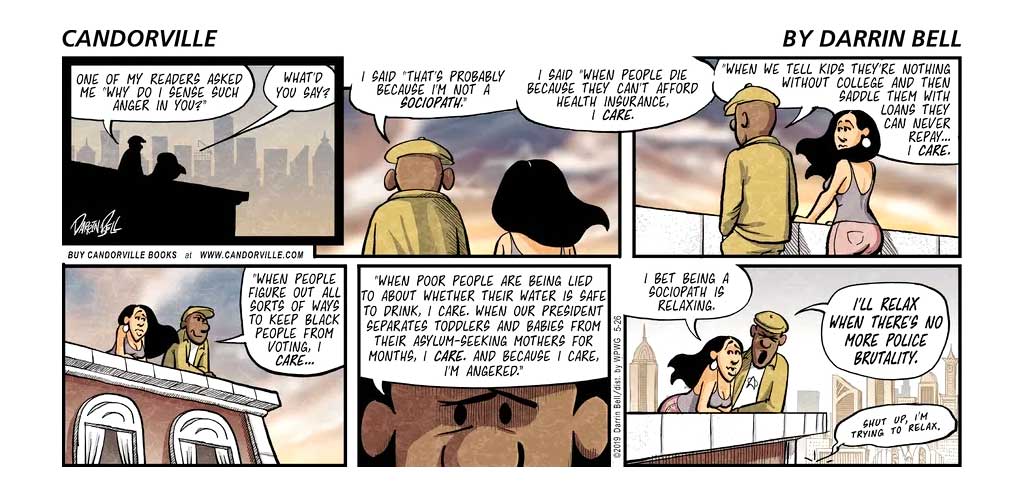
The human race elevated the wrong people for too many thousands of years, and we still haven’t learned. The greedy, insecure, power-hungry, judgmental, and oppressive have taken over and maintained control. The values we say we hold are the opposite of the ways we actually reward people.
So if these are also the types of souls waiting up in Heaven, I choose Hell.
